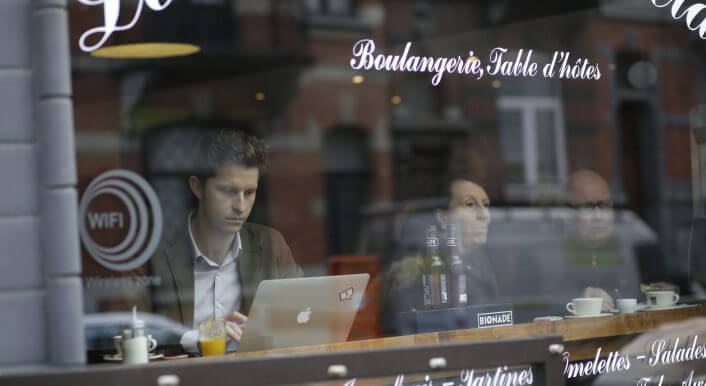35 square meters of transparency
German MPs can now read the secret TTIP consolidated texts but are not allowed talk about what they read. A restraint document obtained by correctiv.org shows the harsh penalties in case of disclosure.

This article was published in cooperation with the Brussels based eu observer.
“It is not a milestone for transparency. It’s just a reading room“, said German economy minister Sigmar Gabriel at the much-awaited opening of a special reading room last Thursday (28 January) in Berlin.
The room that has been set up in the ministry of economy, is the first of its kind offering members of national parliaments the opportunity to read the texts on the EU-US Transatlantic Trade and Investment Partnership (TTIP).
Over the past year transparency has been a key issue in the German debate on TTIP. MPs regardless of their political affiliation demanded bigger insight into the consolidated texts of the planned agreement.
Consolidated TTIP texts have been available so far only in the European Commission in Brussels for a limited number of EU officials involved in the negotiations.
In Germany, the country thought to be one of the biggest beneficiaries of the trade deal, the US embassy in Berlin offered 140 accredited government officials a chance to read the secret documents. Only one German MP was granted entrance.
“Finally, parliamentarians get their right to read“, Gabriel said.
But the rules for reading the documents are quite strict. MPs have to schedule an appointment as the room opens only twice a day for two hours. Before entering the room, they have to leave their mobile phones and any electronic device in a secure locker.
They can read the documents only on a computer screen which is not connected to the Internet. They may take notes but are not allowed to copy any quotes from the consolidated texts.
The room, reminiscent of an internet cafe, hosts up to eight MPs at a time guarded throughout their visit by a security officer.
There is also an English-German dictionary provided for MPs with difficulties understanding the complex trade texts in English.
On her last visit to Berlin, EU trade commissioner Cecilia Malmstroem was asked by German MPs to provide translated versions of the texts, too. Some MPs expressed that they felt disadvantaged by not getting the texts in German.
Malmstroem replied that the commission would provide a translation of the final draft of the agreement, but no consolidated texts will be translated.
Gabriel announced that the ministry would try to assist with translators if a member of parliament wished.
It was the US and the EU which agreed to these rules mainly to control the amount of information becoming public on the ongoing negotiations.
MPs may finally find out what the different positions are in the chapters negotiated on, but they are not allowed to speak publicly about the content or quote any information in the Bundestag debates.
Open on trial basis
A restraint document from the commission shows the consequences of disclosing information.The document, obtained by correctiv.org, lays out the detailed agreement between the US and the EU about access to the consolidated texts.
The US indicates that the availability of the TTIP texts will be on „a trial basis, pending demonstration of the integrity and reliability of the approach“.
In the case of unauthorised disclosure of information, the US „may withdraw its consent to the placement of TTIP consolidated texts in any or all of the member states reading rooms“. This means if an MP leaks or quotes any sensitive information, the parliament may be denied access to the documents.
Gabriel said to the press that it was the joint decision of the EU and the US to set the rules. He would have preferred to have had the reading room in the Bundestag. „I would also prefer to have more transparency“, he said.
The room opens Monday (1 February) at 10am local time. The first MP scheduled for an appointment is Klaus Ernst from the leftist party Die Linke.



